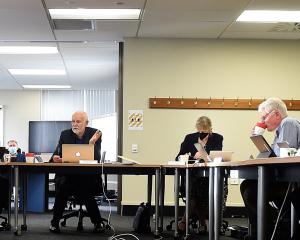Southern District Health Board member Richard Thomson defended his organisation yesterday from a harshly critical report that he says fails to acknowledge the tough financial conditions the DHB works under.
While the former board chairman "fundamentally agreed" with the National Health Board report and welcomed the professional support and opportunity for improvement, Dunedin Hospital's problems owed much to years of relentlessly driving down cost.
It was a "little unfair" the report did not acknowledge funding constraints.
"Our focus has been for more years than I care to count on trying to take cost out of the system to the extent that we have been unable to invest in new plant. We have been unable to invest in many things that we recognise are lacking.
"That impacts on morale, it impacts on people's ability to do their job, it impacts on the patients that we serve."
In terms of results, the DHB had performed, with productivity outputs that stacked up favourably beside other DHBs, Mr Thomson said.
Financial pressures needed to be acknowledged because they were not going away, and would affect the effectiveness of the desired changes.
Dunedin Hospital and DHB management had shown a willingness to confront the hospital's problems in the recent "Putting the Patient First"strategic plan.
He rejected an assertion management and governance roles were muddled, saying board members had an appropriate level of involvement in operational matters.
He defended his place on the "Putting the Patient First" governance group, saying representatives from all parts of an organisation needed to drive change.
He was disappointed the NHB panel did not meet board members in the investigation's early stages to discuss such concerns, whereas it had extensive consultation with staff.
DHB chairman Joe Butterfield and board chief executive Brian Rousseau refused to comment, saying they had only just received the report.
Association of Salaried Medical Specialists executive director Ian Powell said the report was the "most damning" he had seen of a DHB's management.
He applauded the report, saying it vindicated doctors' concerns. The hospital was a "place of lost clinical opportunities" and he hoped doctors would be able to perform even better under a new regime.
Mr Powell agreed with the report's criticism of the present structure of two chief medical officers, one each in Southland and Otago, and said DHB staff did not understand how their roles differed.












